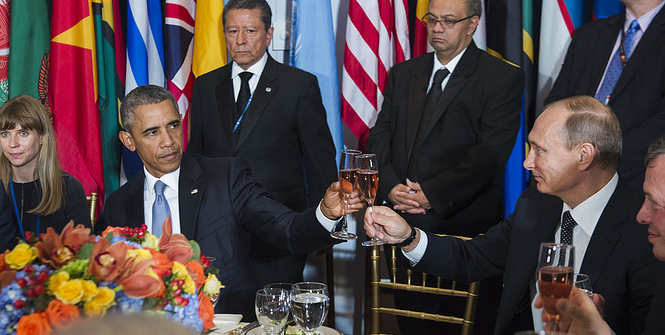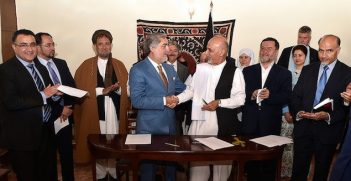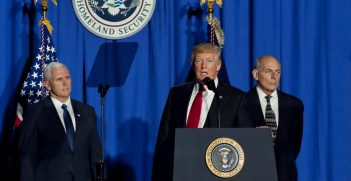Syria: Iranian and Russian Support for Assad

As US President Obama and Russian President Putin met this week in the US to discuss the fight against Islamic State, support for the retention of President Assad of Syria firmed. Australia remained equivocal, with Minister for Foreign Affairs Julie Bishop asserting that all options on Syria were on the table. AIIA Presidential Associate Ian Dudgeon is currently in Iran.
Senior officials of Iran’s Ministry of Foreign Affairs and influential Iranian think tanks informed the author in Tehran last week that the only practical means of achieving stability, and ultimately peace, in Syria was by a political process. That process had to include the government of President Bashar al-Assad.
The Iran officials expressed their concerns that, if the civil war continued in its present form, the local situation would only worsen and precipitate a larger internal crisis than in Iraq. This, also, could be expected to generate a much larger flow of refugees from Syria to Europe and other countries than had occurred to date.
The Iranians saw the interplay of issues in Syria as highly complex, and involving local, regional and international players interacting across a volatile matrix of political, secular and ethnic factors. Some of these domestic factors were further complicated because of their proximate cross-border implications, such as Kurdish issues.
Iran’s view is that the only winner, if this situation continued, would be the Islamic State (IS). IS has demonstrated it is very capable of exploiting, consolidating and expanding its influence in such crisis situations. Iranians see IS not only as a direct threat to Syria, but to all regional countries, because of its transnational character. Threatened states also include those who, wittingly or unwittingly, are directly or indirectly providing support to the IS. Iran believes that because IS was a very serious common threat, all states should cooperate, despite their differences, to combat this threat. Iran’s Foreign Minister, Javad Zarif, emphasised this point to officials during his visit to Gulf countries in July.
Iran has developed a four point plan, which has been circulated to the UN and regional countries, to bring stability, and ultimately peace, to Syria. This plan involved an immediate ceasefire between all fighting factions (certainly government and opposition, although it is unlikely IS would participate); the creation of an interim national unity government; the creation of a national constitution that included the recognition and protection of ethnic minorities; and national elections under international supervision.
Although Iran is supporting the Assad government in the current crisis, it is under no illusion about Assad’s domestic and international reputation and the pressures Assad has for his removal. However, for practical political reasons, Assad had to be included initially as part of the political solution, even if, by due process,he was not part of the end solution.
Iranians emphasise the urgency of cooperation between regional and international states to initiate a political process to bring about stability and peace in Syria and concurrently address the threat of IS. Iran sees international participants as including the U.S., Europe and Russia.
In a separate discussion last week with the author, Russia’s Ambassador to Iran, H.E. Levan Dzhagaryan, stressed that Russia also supports a cooperative regional and international political process to bring about stability and peace in Syria. Russia sees the inclusion of Assad, at least initially, as part of the solution.
Pending such a process, Russia would continue to provide military assistance, at Assad’s request, to help protect the government from being overthrown by armed opposition elements, and avoid the resultant national chaos, with all its implications, that this would precipitate. Russia is also keen to assist the Assad Government to combat the specific threat from IS. Russia sees this threat as mutual. A large number of Russian Islamic extremists are known to have joined IS in Syria. On their return home, they are expected to pose a serious threat to Russia’s national security.
Ian Dudgeon is a Presidential Associate of the AIIA and currently in Iran. This article can be republished with attribution under a Creative Commons Licence.





